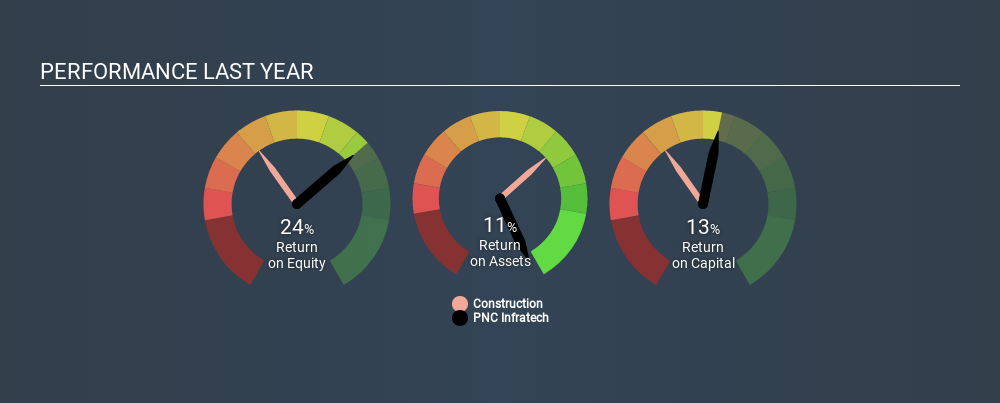- India
- /
- Construction
- /
- NSEI:PNCINFRA
Is PNC Infratech Limited (NSE:PNCINFRA) A High Quality Stock To Own?

One of the best investments we can make is in our own knowledge and skill set. With that in mind, this article will work through how we can use Return On Equity (ROE) to better understand a business. We'll use ROE to examine PNC Infratech Limited (NSE:PNCINFRA), by way of a worked example.
Our data shows PNC Infratech has a return on equity of 24% for the last year. Another way to think of that is that for every ₹1 worth of equity in the company, it was able to earn ₹0.24.
View our latest analysis for PNC Infratech
How Do You Calculate Return On Equity?
The formula for ROE is:
Return on Equity = Net Profit (from continuing operations) ÷ Shareholders' Equity
Or for PNC Infratech:
24% = ₹5.7b ÷ ₹24b (Based on the trailing twelve months to September 2019.)
It's easy to understand the 'net profit' part of that equation, but 'shareholders' equity' requires further explanation. It is the capital paid in by shareholders, plus any retained earnings. You can calculate shareholders' equity by subtracting the company's total liabilities from its total assets.
What Does ROE Mean?
ROE measures a company's profitability against the profit it retains, and any outside investments. The 'return' is the amount earned after tax over the last twelve months. A higher profit will lead to a higher ROE. So, all else being equal, a high ROE is better than a low one. That means ROE can be used to compare two businesses.
Does PNC Infratech Have A Good Return On Equity?
One simple way to determine if a company has a good return on equity is to compare it to the average for its industry. The limitation of this approach is that some companies are quite different from others, even within the same industry classification. As is clear from the image below, PNC Infratech has a better ROE than the average (10%) in the Construction industry.

That's what I like to see. We think a high ROE, alone, is usually enough to justify further research into a company. For example you might check if insiders are buying shares.
The Importance Of Debt To Return On Equity
Companies usually need to invest money to grow their profits. That cash can come from retained earnings, issuing new shares (equity), or debt. In the case of the first and second options, the ROE will reflect this use of cash, for growth. In the latter case, the debt required for growth will boost returns, but will not impact the shareholders' equity. In this manner the use of debt will boost ROE, even though the core economics of the business stay the same.
PNC Infratech's Debt And Its 24% ROE
PNC Infratech clearly uses a significant amount of debt to boost returns, as it has a debt to equity ratio of 1.15. There's no doubt the ROE is respectable, but it's worth keeping in mind that metric is elevated by the use of debt. Debt increases risk and reduces options for the company in the future, so you generally want to see some good returns from using it.
The Bottom Line On ROE
Return on equity is useful for comparing the quality of different businesses. In my book the highest quality companies have high return on equity, despite low debt. All else being equal, a higher ROE is better.
But when a business is high quality, the market often bids it up to a price that reflects this. It is important to consider other factors, such as future profit growth -- and how much investment is required going forward. Check the past profit growth by PNC Infratech by looking at this visualization of past earnings, revenue and cash flow.
If you would prefer check out another company -- one with potentially superior financials -- then do not miss thisfree list of interesting companies, that have HIGH return on equity and low debt.
If you spot an error that warrants correction, please contact the editor at editorial-team@simplywallst.com. This article by Simply Wall St is general in nature. It does not constitute a recommendation to buy or sell any stock, and does not take account of your objectives, or your financial situation. Simply Wall St has no position in the stocks mentioned.
We aim to bring you long-term focused research analysis driven by fundamental data. Note that our analysis may not factor in the latest price-sensitive company announcements or qualitative material. Thank you for reading.
About NSEI:PNCINFRA
PNC Infratech
Operates as an infrastructure investment, development, construction, operation, and management company in India.
Good value with acceptable track record.
Similar Companies
Market Insights
Community Narratives


